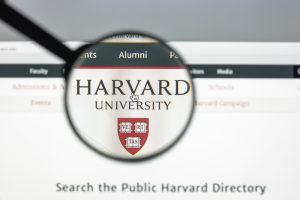Legacy admissions have taken center stage amidst growing controversy over the fairness and equity of college admissions practices. This practice has been a longstanding tradition at Harvard, where legacy applicants—those with parents or close relatives who are alumni—receive an advantage during the admissions evaluation. In this blog, we explore the Harvard legacy acceptance rate and what it means to the top school’s admission practices.
Moreover, we also discuss what percent of Harvard is legacy and what Harvard double legacy acceptance rate is.
What does legacy mean in college admissions?
In college admissions, “legacy” refers to applicants with a familial connection to a particular college or university, typically because their parents or grandparents attended that institution. Admissions committees often consider this status a favorable factor during the selection process.
Does Harvard consider legacies?
Harvard University has a long history of considering legacy status in its admissions process, a practice that dates back nearly a century. This tradition is rooted in a time when many Jewish and immigrant students were starting to compete for spots at American colleges in the 1920s. Family connections began to play a significant role in admissions to maintain a certain student demographic.
Several years later, the influence of legacy status is evident in Harvard’s admissions statistics. For the Class of 2022, about 36% of admitted students had a relative who previously attended the university. However, this percentage has significantly decreased in recent years. For the Class of 2025, only 16% of admitted students were legacies; for the Class of 2024, this figure was 12%.

Harvard considers students with at least one parent who graduated from Harvard or Radcliffe, its former sister institution, as “legacy students.” Historically, this status has given these applicants an advantage in the admissions process.
Currently, Harvard and other prestigious American colleges claim that legacy status is one of many factors used to build a diverse and dynamic campus community and alumni network. They argue that this practice is the same as considering race or other characteristics to enrich the student body.
What is Harvard’s legacy acceptance rate?
Between 2014 and 2019, the acceptance rate for legacy applicants at Harvard was 33%, compared to the overall acceptance rate of around 6%.
In 2022, Harvard’s overall acceptance rate dropped to 3.2%. According to reports, the acceptance rate for donor-related applicants was approximately 42%, while the acceptance rate for legacy applicants was 34%.
Moreover, what percent of Harvard is legacy? Approximately 14% of Harvard’s undergraduate student body are legacy students, as revealed by data from the Harvard admissions office during a 2019 trial related to the Students for Fair Admissions (SFFA) lawsuit. This percentage highlights legacy admissions’ significant role in Harvard’s overall admissions strategy. Legacy students are those who have at least one parent who graduated from Harvard, and this preferential treatment has been a topic of ongoing debate regarding its impact on diversity and equity in college admissions.
What is considered a legacy at Harvard?
A legacy at Harvard is typically a student who has a direct familial connection to an alumnus of the school, most commonly a parent. Here are the specifics:
- Direct Relationship: Legacies are usually the children of alumni. For instance, if your mother graduated from Harvard College, you are considered a Harvard legacy.
- Remote Relatives: More distant relatives, such as aunts, uncles, and cousins, are generally not considered in legacy admissions. Grandparents might be considered in some cases, but this is not always the case.
- Parental Degrees: The admissions office primarily considers legacies if the parent(s) earned their undergraduate degrees from Harvard. If your parents obtained professional or graduate degrees (such as from Harvard Law School), it is less likely you will be considered a legacy for undergraduate admissions.
Colleges continue to value legacy status for several reasons:
- Economic Contributions: Alumni whose children attend their alma mater are more likely to donate to the institution and participate in alumni events.
- Community Building: Legacy admissions help maintain a strong, engaged alumni community. Given their family ties to the institution, legacy students are expected to become active and involved alumni in the future.
In essence, legacy admissions are a way for educational institutions to maintain and strengthen ties with their alumni community, ensuring ongoing support and engagement from both current and future alumni.
Different Kinds of Legacy Applications
Not all legacy candidates are the same, and they can be categorized at various levels based on their familial connections. Here are the different types of legacy applications:
Primary Legacies
- Direct Parental Connection: The most competitive legacy applicants are those whose parents attended the college as undergraduates and earned a degree from the institution. These candidates typically receive the highest level of consideration.
- Attendance Without Graduation: Some institutions may recognize a legacy status even if the parent attended but did not graduate from the school.
First-Generation Considerations
- First in Family: Applicants who are the first in their family to attend college may also receive special consideration. However, their first-generation status would be revoked if either of their parents attended college.
Secondary Legacies
- Graduate Degrees: Applicants whose parents earned degrees from the college’s graduate programs may also be considered legacies, though this is less common and usually given lower priority than undergraduate connections.
- Extended Family: Applicants with grandparents, aunts, uncles, or siblings who attended the university as undergraduates fall into this category. In these cases, primary relationships (parents) take precedence over extended family connections unless the extended family member has shown significant involvement with the institution through volunteering, service on boards, or substantial financial contributions.
Additional Considerations
- Generosity and Involvement: An applicant may be given greater consideration if a family member is notably generous with their time or legacy giving. This can include substantial donations, active participation in alumni events, or serving on institutional boards.

In summary, the level of legacy consideration varies based on the closeness of the familial relationship and the degree of involvement and contribution to the institution by the legacy family members.
What is double legacy?
A double legacy refers to an applicant whose both parents, or other close family members like grandparents or siblings, attended the same college or university. This status often gives applicants a stronger advantage than single legacy status, where only one family member is an alumnus.
Colleges that consider legacy preferences may favor double legacy applicants, believing they have a strong connection to the university and will continue the tradition of alumni engagement. This perceived loyalty is seen as beneficial for maintaining long-term relationships with alumni, leading to ongoing financial contributions and support for the university.
So what is Harvard double legacy acceptance rate?
Harvard University doesn’t disclose specific acceptance rates for double legacy applicants. However, legacy applicants generally have a much higher acceptance rate than the overall pool—about 33% compared to 5% between 2014 and 2019.
Double legacy applicants, with both parents as alumni, likely have an even higher acceptance rate due to their strong ties and potential for continued alumni engagement and donations. This means that the Harvard double legacy acceptance rate may be high as well. While exact figures aren’t available, it’s inferred that double legacy acceptance rates are significantly higher than general legacy rates. Precise statistics would require access to Harvard’s internal admissions data.
How is legacy admission connected with early action?
The Harvard early action acceptance rate for the class of 2028 is at 8.7%. Legacy admissions are often tied to early action (EA) or early decision (ED) programs at many universities, including Harvard. Here’s how this connection typically works:
- Higher Acceptance Rates: EA and ED programs usually have higher acceptance rates than regular decision rounds. Legacy applicants in these early programs may have an even greater advantage due to their alumni connections, increasing their chances of admission.
- Demonstrated Interest: Applying through EA or ED shows a strong commitment to the institution. For legacy applicants, this can be an added benefit, suggesting that the family tradition of attending the school will continue.
- Strategic Advantage: Universities often encourage legacy applicants to apply early to increase their admission chances. Applying early also helps the institution manage its yield, as legacy students who apply early are seen as more likely to attend if admitted.
- Early Decision Binding Commitment: For schools with ED programs, the binding nature means admitted students must attend. This is appealing to universities because it ensures that admitted legacy students will enroll, maintaining alumni ties and potential financial contributions.
- Institutional Priorities: Universities use early admission rounds to shape their incoming class according to their priorities which is why the Harvard early action acceptance rate is typically higher than its regular decision rate. Legacy applicants often fit these priorities, helping maintain alumni connections and potentially boosting future donations and engagement.
In summary, legacy admissions and early action or early decision programs offer strategic advantages to both applicants and institutions. Legacy applicants are encouraged to apply early to leverage higher acceptance rates and demonstrate their commitment, while institutions benefit from securing dedicated students and maintaining strong alumni relations.
The Harvard Legacy Admission Controversy
The Harvard legacy admission controversy has sparked a lot of attention. It centered around fairness in college admissions. In 2019, Students for Fair Admissions (SFFA) sued Harvard, claiming its admissions practices, including legacy preferences, discriminated against Asian American applicants. The trial showed that between 2014 and 2019, legacy students had a 33% acceptance rate, while the overall rate was about 5%. This disparity raised concerns that legacy admissions favor wealthy, mostly white families.

In June 2023, the U.S. Supreme Court ruled against Harvard’s race-conscious admissions policies, renewing scrutiny of legacy preferences. President Joe Biden and other leaders called for an end to legacy admissions, saying they promote inequality and harm merit-based admissions. In July 2023, the U.S. Department of Education began investigating Harvard legacy acceptance rate, adding to the controversy. These events have led students, alumni, and education reform advocates to push for Harvard to end legacy preferences to create a fairer admissions process.
Critics say legacy admissions mostly benefit wealthy, white families, keeping an elitist status quo. They believe this policy harms efforts to make admissions more inclusive and merit-based, as legacy applicants often get advantages regardless of their qualifications.
Supporters argue that legacy admissions boost alumni loyalty and financial donations, which are important for funding scholarships, facilities, and programs. They also believe that family traditions of attending Harvard can strengthen the community. Despite these points, the legacy admissions policy remains controversial, with growing demands for reform from students, alumni, and education advocates pushing for greater fairness in college admissions.
Will Harvard stop legacy admissions?
As of now, Harvard University has not officially announced an end to legacy admissions, but the practice is under increasing scrutiny and pressure to change. In July 2023, following the U.S. Supreme Court’s decision against race-conscious admissions, the U.S. Department of Education launched an investigation into Harvard’s legacy admissions practices. T
his investigation aims to determine whether these practices violate civil rights laws by disproportionately benefiting white and affluent students. Harvard legacy acceptance rate is significantly higher than its overall acceptance rate, with legacy applicants being admitted at about 33% compared to the general rate of around 5% from 2014 to 2019.
In response to growing criticism, Harvard has repeatedly reviewed its admissions policies to ensure they align with the university’s mission and values. However, as of mid-2024, no definitive steps have been taken to abolish legacy preferences. The ongoing federal investigation, coupled with increased public and political pressure, might influence Harvard to reconsider or modify its legacy admissions policy in the near future.
If Harvard decides to eliminate or reform this practice, it could set a precedent for other elite universities facing similar criticisms, potentially leading to a broader shift in college admissions practices across the United States.
So what is the future of legacy admissions, and how will that affect the Harvard legacy admission rate?
In the summer of 2023, Harvard University announced that it had launched an internal review of its admissions policies, with a specific focus on legacy preferences. Hopi Hoekstra, Harvard’s Dean of the Faculty of Arts and Sciences, mentioned that ending legacy preferences has been one of the things under consideration.
This review comes amid increasing criticism and scrutiny over the fairness and equity of legacy admissions, which critics argue are antimeritocratic and reinforce hereditary wealth inequities. According to a 2022 Pew Research Center survey, 75 percent of Americans disapprove of legacy preferences, reflecting widespread public discontent with the practice.

Harvard is not alone in offering admissions advantages to the children of alumni. Approximately 500 nonprofit four-year U.S. colleges consider legacy status in admissions, as reported by the nonprofit think tank Education Reform Now.
Among top-tier institutions, the legacy advantage is particularly pronounced. A 2023 study by professors from Harvard and Brown University found that at 12 elite colleges, known as “Ivy-Plus,” legacy applicants were about four times more likely to be admitted than students with equivalent test scores.
Despite these criticisms, elite colleges have a significant financial incentive to maintain legacy preferences. A 2022 study by MIT and University of Colorado professors found that donations are strongly linked to legacy admissions, with legacy students generally being wealthier and more likely to pay full tuition, thus providing a crucial source of funding for these institutions.
Why should legacy admissions at Harvard be continued?
Many schools see legacy college admissions as a strategy to encourage donations from alumni. By giving legacy applicants an edge, institutions believe they can maintain strong financial support from former students. The primary argument for this preference is financial, as legacy admissions are thought to help secure the funds necessary for a school’s operations and financial aid programs.
For example, a Harvard committee established in 2017 found that removing the legacy preference could jeopardize the “generous financial support” crucial to Harvard’s status as a leading educational institution.

The committee also determined that eliminating legacy admissions would not significantly impact the number of students admitted each year, which somehow explains the Harvard legacy acceptance rate now. They concluded that the legacy preference helps keep alumni engaged with the university, encouraging them to donate and volunteer their time, such as interviewing prospective students.
Despite the legacy advantage, legacy applicants must still meet high academic standards, including taking challenging courses, achieving high GPAs, scoring well on standardized tests, and participating meaningfully in extracurricular activities. Having a family history with the institution does not guarantee admission; rather, it means that if all other qualifications are equal, the legacy applicant may be given precedence.
Legacy applicants are encouraged to apply through early admission programs (early decision, restricted early action, or early action) to show their genuine interest in attending the school. These programs often have higher acceptance rates for legacy applicants due to their more restrictive nature. However, being a legacy applicant does not guarantee acceptance, as the admissions process considers multiple factors beyond legacy status.
Applying to Harvard is highly competitive, with many talented students vying for limited spots. If you are a legacy applicant, it’s important to understand the Harvard legacy acceptance rate and strengthen other parts of your application. AdmissionSight can assist you with this process, offering guidance to improve your chances of getting into your dream school. Consider setting up a free initial consultation with AdmissionSight to discuss your application strategy.





































